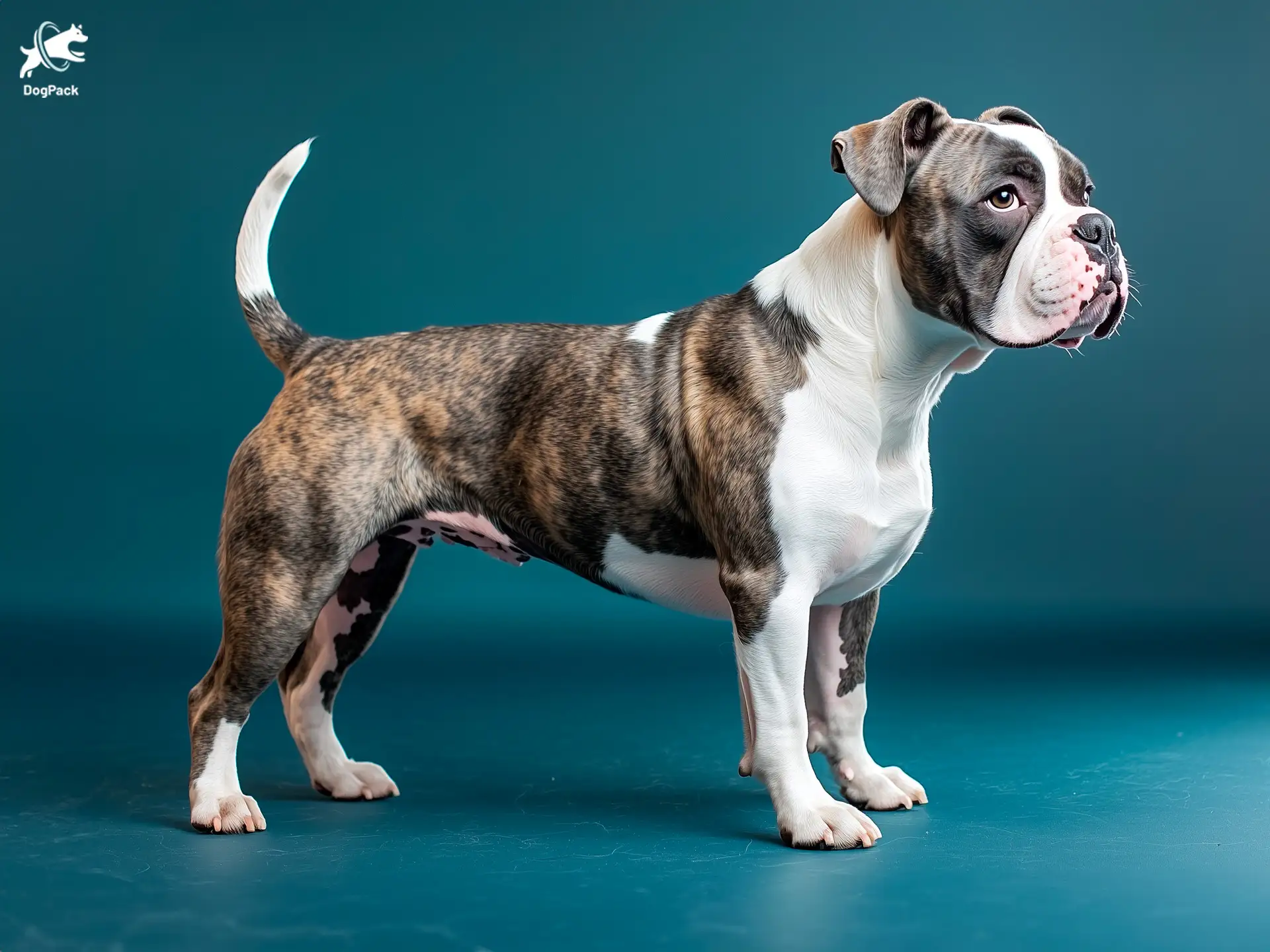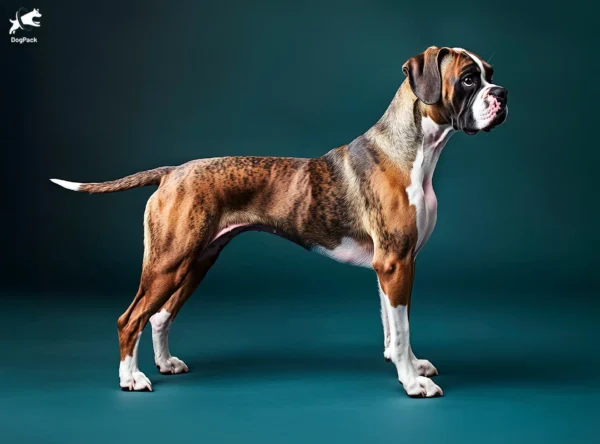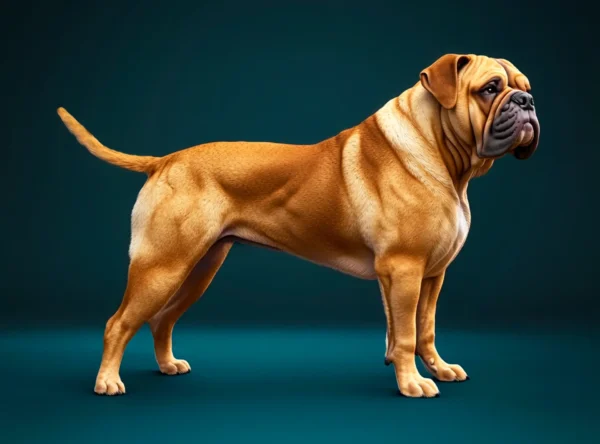American Bulldog Dog Breed Info & Overview
Strong, confident, and full of love—that’s the American Bulldog in a nutshell. This muscular breed is not just a working dog but also a loyal family member. Known for their protective instincts and friendly demeanor, American Bulldogs make wonderful companions for those ready to embrace their energetic spirit.
Characteristics
Pictures
Breed History
Did you know that the American Bulldog nearly faced extinction after World War II? Originating from English Bulldogs brought to America, they were primarily used as farm dogs for tasks like guarding livestock and property. Thanks to dedicated breeders like John D. Johnson, the breed was revived and preserved, becoming the strong and versatile dogs we know today.
These dogs were essential on Southern farms, helping with everything from herding cattle to hunting wild boar. Their agility and strength made them invaluable to farmers. The breed’s resilience and adaptability allowed it to thrive in various working environments.
Over time, the American Bulldog transitioned from a farm utility dog to a beloved family companion. While still maintaining their working dog roots, they’ve become known for their loyalty and protective nature towards their human families.
Temperament, Personality
American Bulldogs are known for their confident and courageous temperament. They form strong bonds with their families and are exceptionally loyal. If you’re looking for a dog that will be a devoted companion, this breed fits the bill.
With children, they are typically gentle and patient, making them great family pets. However, early socialization is key to ensure they interact well with strangers and other animals. Their protective instincts can make them wary of unfamiliar people, so introducing them to a variety of situations helps them become well-rounded dogs.
Despite their tough exterior, American Bulldogs have a playful side. They enjoy engaging in games and activities with their families, making them a fun addition to an active household.
Physical Characteristics
The American Bulldog is a robust and athletic dog with a muscular build. Their strong jaws and broad heads give them a powerful appearance. Males are generally larger, standing between 22–28 inches (56–71 cm) tall, while females range from 20–26 inches (51–66 cm).
Their short coat is usually white or white with patches of brindle, red, or brown. The coat is smooth and requires minimal grooming, but their skin can be sensitive, so regular checks are important.
One of the breed’s distinctive features is their expressive eyes, which can convey a range of emotions from curiosity to affection. Their overall appearance reflects their strength and agility.
Health Issues
While generally healthy, American Bulldogs can be prone to certain health issues. Hip dysplasia is common due to their size and build. Regular veterinary check-ups and maintaining a healthy weight can help manage this condition.
They may also be susceptible to skin allergies and conditions like mange. Keeping their skin clean and monitoring for any irritations is crucial. Additionally, some can experience issues like cherry eye or entropion, which affect the eyelids.
It’s important to work with a reputable breeder who screens for genetic conditions. Regular exercise, a balanced diet, and routine vet visits will help keep your American Bulldog in top shape.
Grooming Needs
Good news for those who dread endless grooming sessions—the American Bulldog’s short coat is low maintenance. A weekly brush with a firm bristle brush helps remove loose hair and keeps their coat shiny.
Bathing should be done as needed, typically every few months unless they get into something messy. Be mindful of their skin, as they can be prone to dryness or irritation. Using a gentle dog shampoo is recommended.
Don’t forget about dental hygiene and nail care. Regular teeth brushing and nail trimming are essential parts of their grooming routine to keep them healthy from head to paw.
Exercise Requirements
American Bulldogs are energetic and need plenty of physical activity. Aim for at least 1–2 hours of exercise per day to keep them happy and prevent boredom, which can lead to destructive behavior.
They enjoy activities like long walks, jogging, and playing fetch. Mental stimulation is also important—consider puzzle toys or obedience training to engage their minds.
Providing ample exercise not only keeps them physically fit but also strengthens your bond. These dogs thrive when they have a job to do or a task to focus on.
Training Tips
Training an American Bulldog requires consistency and positive reinforcement. They are intelligent but can be strong-willed, so establishing yourself as a firm but fair leader is key.
Start socialization and basic obedience training early. Expose them to different environments, people, and other animals to build their confidence and good manners.
Avoid harsh training methods, as they respond better to praise and rewards. Patience and persistence will yield a well-behaved and loyal companion.
Nutrition, Diet
Feeding an American Bulldog requires attention to quality and portion control. Due to their muscular build and high energy, they need a diet rich in protein. High-quality commercial dog food formulated for large breeds is suitable.
Portion sizes will vary based on age, weight, and activity level, but generally, they consume 3–4 cups of dry food per day, split into two meals. Overfeeding can lead to obesity and exacerbate health issues like hip dysplasia.
Always provide fresh water and consult your veterinarian to tailor a diet plan that meets your dog’s specific needs.
Adoption, Breeders
If you’re considering adding an American Bulldog to your family, look for reputable breeders who prioritize health and temperament. The American Bulldog Association is a great resource for finding certified breeders.
Adoption is another wonderful option. Organizations like American Bulldog Rescue help find homes for dogs in need. Always ensure you’re working with reputable sources to avoid supporting puppy mills.
Remember to ask for health clearances and meet the puppy’s parents if possible. This gives you insight into the potential temperament and health of your future companion.
Family Pet?
American Bulldogs can make excellent family pets for active households. Their affectionate nature and loyalty mean they form strong bonds with family members, including children.
They are generally good with kids but should be supervised due to their size and strength. Teaching both the dog and children proper interaction is important to ensure a harmonious relationship.
Early socialization with other pets is essential. They may have a high prey drive, so introducing them to other animals gradually and under supervision will help them coexist peacefully.
Right For You?
If you’re an active person or family looking for a devoted and protective companion, the American Bulldog might be the perfect match. They thrive in environments where they have plenty of space to play and tasks to keep them engaged.
However, they may not be ideal for first-time dog owners due to their training needs and energy level. Consider your lifestyle and ability to provide the exercise and leadership this breed requires.
In the right home, an American Bulldog will be a loving and loyal addition, ready to join in on all your adventures.
Conclusion
In summary, the American Bulldog is a strong, loyal, and affectionate breed that can bring joy and protection to the right family. Their energetic nature and need for companionship make them best suited for active owners who can provide plenty of exercise and attention. If you’re ready for a devoted friend who will stand by your side, the American Bulldog might just be your perfect match.
FAQs
-
Are American Bulldogs good with other pets?
American Bulldogs can get along with other pets if properly socialized from a young age. Early introductions and supervised interactions help them coexist peacefully with other animals.
-
Do American Bulldogs drool a lot?
Yes, American Bulldogs are known to drool, especially after eating or drinking. Keeping a towel handy and regular cleaning can help manage the drooling.
-
How much do American Bulldog puppies cost?
The cost of an American Bulldog puppy can range from $1,000 to $2,500, depending on the breeder, lineage, and location. Always choose reputable breeders to ensure a healthy puppy.
-
Are American Bulldogs aggressive?
American Bulldogs are not inherently aggressive but can be protective. Proper training and socialization are essential to ensure they are well-behaved and confident in various situations.
-
Can American Bulldogs live in apartments?
Due to their size and energy level, American Bulldogs are better suited to homes with space to roam. They may adapt to apartment living if provided with ample daily exercise.
Breed Ratings
American Bulldogs are smart and capable learners, especially when training is consistent and engaging.
They love to play and enjoy interactive games with their family members.
High energy levels require regular exercise to keep them happy and prevent boredom.
Moderate shedding occurs year-round, but regular brushing helps manage loose hair.
They may chase smaller animals due to their working dog background, so supervision is advised.
Their short coat is low maintenance, requiring minimal grooming effort.
With consistent training and positive reinforcement, they can excel in obedience.
They prefer companionship and may develop separation anxiety if left alone for long periods.
Generally quiet, they may bark to alert but are not excessive barkers.
Expect a fair amount of drool, especially after meals or during warm weather.
Can be friendly with other dogs if socialized early; however, may show dominance.
Generally healthy but prone to certain genetic conditions; regular vet care is important.













